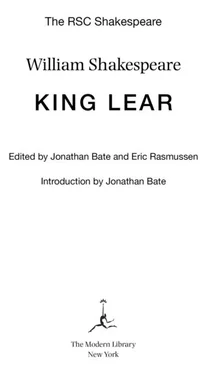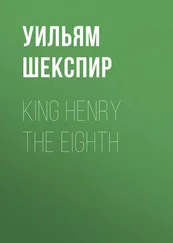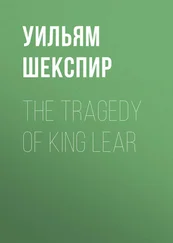уильям шекспир - King Lear
Здесь есть возможность читать онлайн «уильям шекспир - King Lear» весь текст электронной книги совершенно бесплатно (целиком полную версию без сокращений). В некоторых случаях можно слушать аудио, скачать через торрент в формате fb2 и присутствует краткое содержание. Год выпуска: 2011, ISBN: 2011, Издательство: Random House Publishing Group, Жанр: Старинная литература, на английском языке. Описание произведения, (предисловие) а так же отзывы посетителей доступны на портале библиотеки ЛибКат.
- Название:King Lear
- Автор:
- Издательство:Random House Publishing Group
- Жанр:
- Год:2011
- ISBN:978-1-58836-828-7
- Рейтинг книги:3 / 5. Голосов: 1
-
Избранное:Добавить в избранное
- Отзывы:
-
Ваша оценка:
- 60
- 1
- 2
- 3
- 4
- 5
King Lear: краткое содержание, описание и аннотация
Предлагаем к чтению аннотацию, описание, краткое содержание или предисловие (зависит от того, что написал сам автор книги «King Lear»). Если вы не нашли необходимую информацию о книге — напишите в комментариях, мы постараемся отыскать её.
King Lear — читать онлайн бесплатно полную книгу (весь текст) целиком
Ниже представлен текст книги, разбитый по страницам. Система сохранения места последней прочитанной страницы, позволяет с удобством читать онлайн бесплатно книгу «King Lear», без необходимости каждый раз заново искать на чём Вы остановились. Поставьте закладку, и сможете в любой момент перейти на страницу, на которой закончили чтение.
Интервал:
Закладка:
Warner:My interest in both my productions was to release the characters through their language and their relationships. What the play does is to take the audience into the interior of themselves. It is a mirror of the desolation of the human spirit, how lost it is, how far we fall in families and how hard sought are the conditions that prompt personal change. That’s why the setting of any given production has little connection to the key that may unlock the scenes and acts. The play has to flow through our imaginations and then it has to lodge, and that is why I used such a pared-down aesthetic so that the space is clear for that to happen. All great plays do this but each must be met in their particular. With Kick Theatre in 1985 we were in a church hall in Edinburgh with three ladders and a bucket of water for the heath scene. With the NT [National Theatre] we were on the wide open stage of the Lyttelton Theatre where different aesthetic choices needed to be made before we began. Hildegard Bechtler’s set was poetic and beautiful but bare, and the “world” was not precisely named by it. It was not the “Stone Age Lear,” or the “Third Reich Lear” but the Brian Cox, David Bradley, Ian McKellen, Susie Engel, and Clare Higgins Lear . It was actor led and actor inspired and I still believe that that is a very good way with Shakespeare. Belief in casting and the group creation of the world is what matters.
Nunn:Shakespeare says that King Lear is the king of Ancient Britain. On the other hand, Shakespeare includes scenes involving dueling with swords, there are references to a graced palace, to women wearing gorgeous clothes that scarcely keep them warm, and Gloucester refers to wearing spectacles. Shakespeare is making clear that he doesn’t mind breaking the rules as far as historical accuracy goes. It’s very likely that King Lear was performed at the Globe, or indeed at court performances, with the actors wearing a mixture of contemporary Elizabethan/Jacobean clothing, with some additional elements of cloak and robe that would indicate an earlier period.
I think Shakespeare was interested in the idea that a history play should apply acutely and precisely to the age that the audience lives in, so he was keen to have it both ways. I’ve seen Stonehenge-based productions of King Lear , and frankly it does seem very odd that Lear should make such a fuss about being out on a heath in a storm when his normal domestic condition appears to be open to the elements.
Shakespeare is presenting the huge contrast between a man who has been encouraged to believe that he is the closest thing to a god in human terms, and the man who comes to perceive he is like a beggar “no more but this.” Lear is a conduit of the gods and he’s in totally autocratic authority. His smallest whisper is converted into law, and nobody, such as Kent, can question him. So, in this production, I have elected to set the play in a seemingly nineteenth-century environment with resonances of the tsarist order in Russia and/or the Austrian autocracy of Franz Joseph. The intention is to stress that Lear’s power is total and dictatorial like a tsar or an emperor, in all matters, political and social, and that it derives from god with whom he communicates. This, I think, allows us to encompass the requirements of the social structure of the play and, what’s more, the anachronisms make complete sense. Lear’s journey takes him from that autocratic power to somebody who, in the storm, asks himself for the first time, “How do wretches survive in conditions like these, if they cannot keep warm because they have no proper clothing?” And then, wanting to embrace that houseless situation, he meets Tom o’Bedlam (who happens to be a man going through the same crisis, another man who’s been used to comfort and is now, in order to survive, turning himself into a crazed beggar), and as he studies the beggar’s naked exposure, Lear urgently wants to place himself in that condition, so he can experience being the “forked animal” for himself.
Shakespeare had long been fascinated with the philosophical idea that a king can journey through the guts of a beggar. He has used the notion of king to beggar on a number of previous occasions, but in Lear he takes it to the extreme. I think Richard II is almost a sketch for King Lear; here we have a godlike king who in the end is sobbing, “I need friends and since I am ordinary like you—how can you say I am a king?” Shakespeare takes that king to a small prison cell, and then, alone and the lord of nothing, he grants him extraordinary self-knowledge. But in King Lear , the journey of the king is to a yet more extreme destination.
Why did your Lear react so extremely to Cordelia’s refusal to play the game of quantifying her love in words (or perhaps of quantifying her love all too literally—if I marry, my father will have 50 percent of my love and my husband the other 50 percent)?
Noble:In a way you have to go back a step from that to ask yourself why Lear loves Cordelia so much more than the other two girls. There are dozens of reasons why, and I think most families could find their own reason why one child is, or appears to be, more beloved than the other. If the character in question is an obsessive like Lear then it starts getting potentially dangerous. His little girl has grown up and defies him, and he can’t deal with that at all. He can’t deal with retiring, he can’t deal with getting old, he can’t deal with not being in control anymore. And as a consequence of all these things poor Cordelia gets it in the neck. And he regrets it almost immediately. Within a day he regrets it—probably within hours.
Warner:My Lear was a spoilt Lear, a vain Lear—a man who wants to hear what he wants to hear. His foolish gung-ho confidence is to wrap and disguise his need—a desire for a public show of affection—in a party game. He makes light of something that is weighty and important to him so that nobody suspects his underlying vulnerability. He demands that his daughters play out in public something that is private, and he claims this right because the prizes are high and marvelous. However, he knows who will take which prize because the “game” is rigged—the parcels of land are already named, signed, and sealed by king and court. The whole extravagant business is a contrivance to feed his vanity, to continue to make him feel that he holds the center even in old age. We are witnessing a grotesque public massage of ego. Lear is a man used to getting what he wants, but he gets badly burnt. He discovers that love is not a commodity, that it must be given freely. It may be that he has lost sight of what love is a long time before the play begins. He’s getting the answer he wants in two cases from the very daughters he did not treat well—if their behavior later in the piece is anything to go by—and seems to barely know the character of his favorite—Cordelia—whose reaction is a huge surprise to him. There is a lot we do not know about this mysterious man, but his short-sightedness is placed on the table at the very opening of the play. Here is a man who will need to travel far to begin to gain the gift of personal insight. His friend Gloucester will literally lose his sight: blind men both.

6. Ian McKellen as Lear in Trevor Nunn’s 2007 production, in the opening scene with quasi-military “Ruritanian” regalia.
And why didn’t your Cordelia, or why couldn’t she, put her love into words?
Noble:That’s a much more difficult question to answer. It’s a young person’s thing, whereby the spoken truth is more important than making your mum and dad happy. It’s the moment of leaving home. The domestic psychological detail is very precise in the play. In Lear’s household, Cordelia is at the point of leaving home to go and get married. That’s a huge moment in every family, although it’s very often not recognized. Some daughters never leave home. They are still at home, in the thrall of their parents, when they’re seventy. Cordelia leaves home and Lear can’t deal with that. But she knows she has to do it, especially with a father like him.
Читать дальшеИнтервал:
Закладка:
Похожие книги на «King Lear»
Представляем Вашему вниманию похожие книги на «King Lear» списком для выбора. Мы отобрали схожую по названию и смыслу литературу в надежде предоставить читателям больше вариантов отыскать новые, интересные, ещё непрочитанные произведения.
Обсуждение, отзывы о книге «King Lear» и просто собственные мнения читателей. Оставьте ваши комментарии, напишите, что Вы думаете о произведении, его смысле или главных героях. Укажите что конкретно понравилось, а что нет, и почему Вы так считаете.












